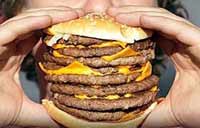McDonald’s to make Kosovo land of peace and happiness, US officials believe
The competition to obtain the franchise for the opening of the first McDonald’s restaurant will take place in Kosovo soon. An official spokesman for the US Chamber of Commerce in Kosovo, Mimoza Kusari, believes that the appearance of the world-known brand would make Kosovo a much more attractive region.

“The opening of a McDonald's in Kosovo would improve the image of the country a lot,” she said. “It generally opens way for other American companies to invest and develop economic ties with the country where McDonald's is open,” the official explained.
Kusari added that more than 800 Kosovo firms would participate in the competition to win the McDonald’s franchise. It is worthy of note that McDonald’s restaurants can be found in all countries of the Balkan region, save for Albania.
Officials of the Kosovo authorities have repeatedly emphasized that they would be ready to strengthen trade and economic tied with other countries, those which recognized the independence of Kosovo, first and foremost.
The McDonald’s restaurant that opened in Serbia’s Belgrade in March of 1989 became the first restaurant of the chain to have been opened in Eastern Europe. The restaurant was destroyed on February 21 during massive riots after the declaration of Kosovo’s independence. A large group of people set the restaurant on fire and broke all windows in another McDonald’s restaurant.
As a prominent example of the rapidly globalization of American fast food industry, McDonald's is often the target of criticism for its menu, its expansion, and its business practices.
For example, in 1990, two British activists, David Morris and Helen Steel, distributed leaflets entitled What's wrong with McDonald's? on the streets of London. McDonald's wrote to Steel and Morris demanding they desist and apologize, and, when they refused, sued them for libel in a case known colloquially as the McLibel case.
In 2001, Eric Schlosser's book Fast Food Nation included criticism of McDonald's' business practices. Among the critiques are allegations that McDonald's (along with other companies within the fast-food industry) uses its political influence to increase their own profits at the expense of people's health and the social conditions of its workers. The book also brings into question McDonald's advertisement techniques where it targets children. While the book does mention other fast-food chains, it focuses primarily on McDonald's.
In 2002, vegetarian groups, largely Hindu, successfully sued McDonald's for misrepresenting their French fries as vegetarian. Even after the discontinuation of frying the French fries in beef tallow in 1990, the French fries still had beef extract added to them. The French fries sold in the U.S. still contain beef and animal flavoring. McDonald's biscuits also contain beef flavoring along with animal flavoring.
Morgan Spurlock's 2004 documentary film Super Size Me said that McDonald's food was contributing to the epidemic of obesity in society, and failing to provide nutritional information about its food for its customers.
Prepared by Dmitry Sudakov
Pravda.ru
Subscribe to Pravda.Ru Telegram channel, Facebook, RSS!




